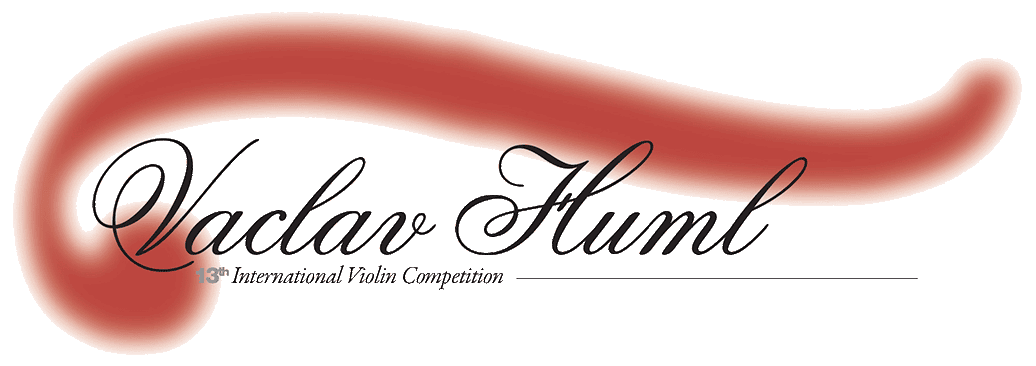About the project
Ottava alta
Goran Končar and Bruno Vlahek
The release OTTAVA ALTA presents works for the violin by three doyens of Croatian composing - Bruno Bjelinski, Stjepan Šulek and Ivo Malec, performed by violinist Goran Končar, pianist Bruno Vlahek and the Symphony Orchestra of the Croatian Radiotelevision under the conducting of Mo Nikša Bareza.
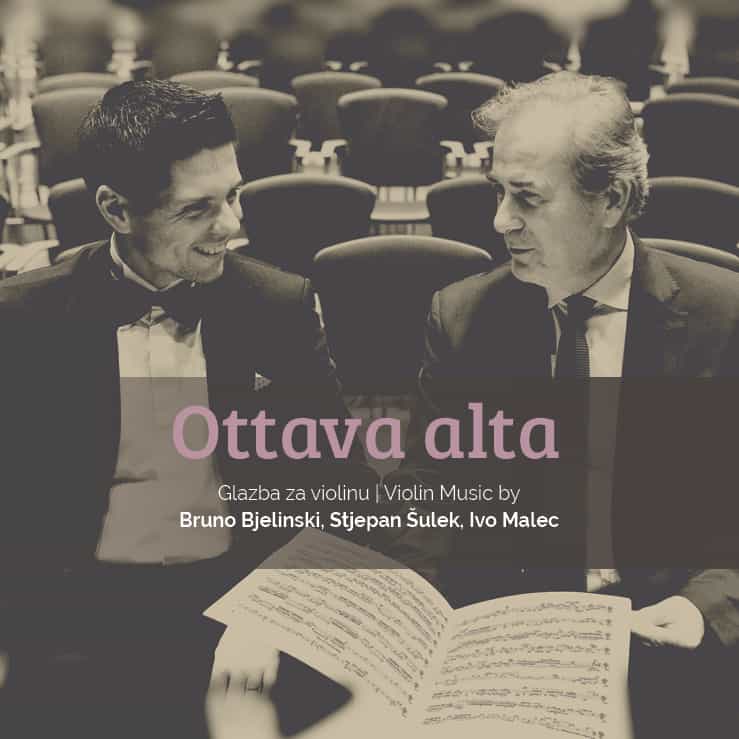
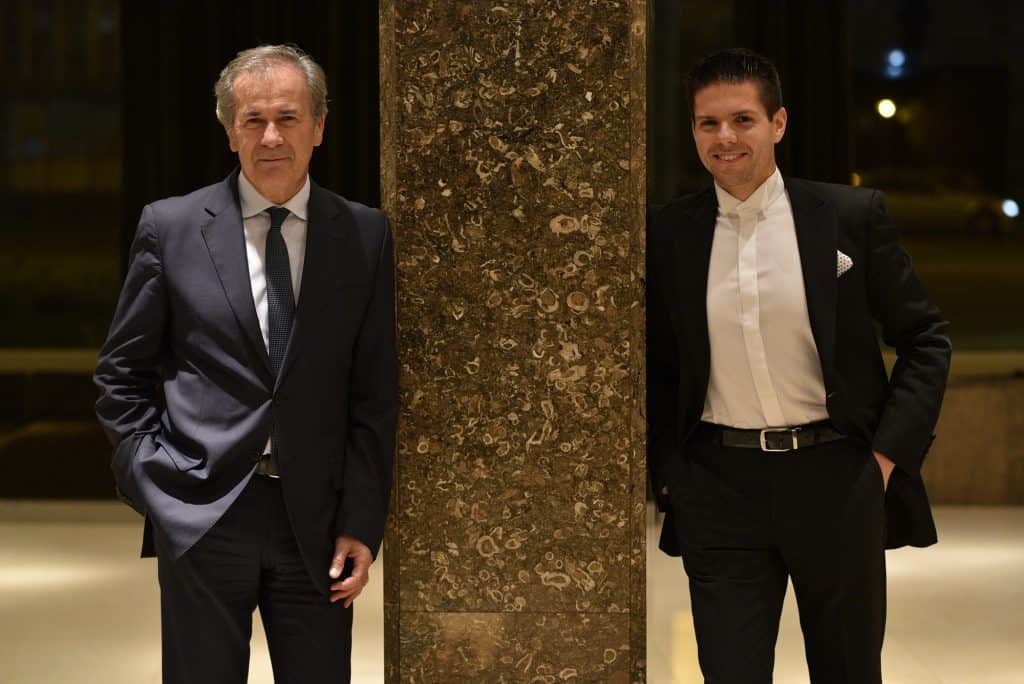
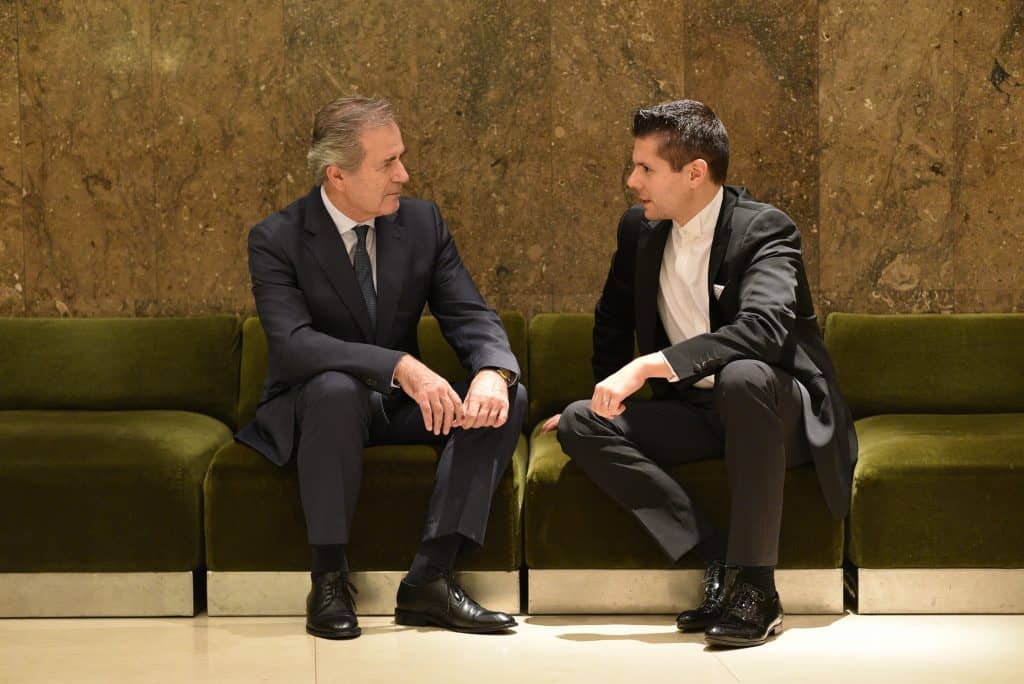
Voici un disque indispensable par l’interprétation magistrale...
About the program
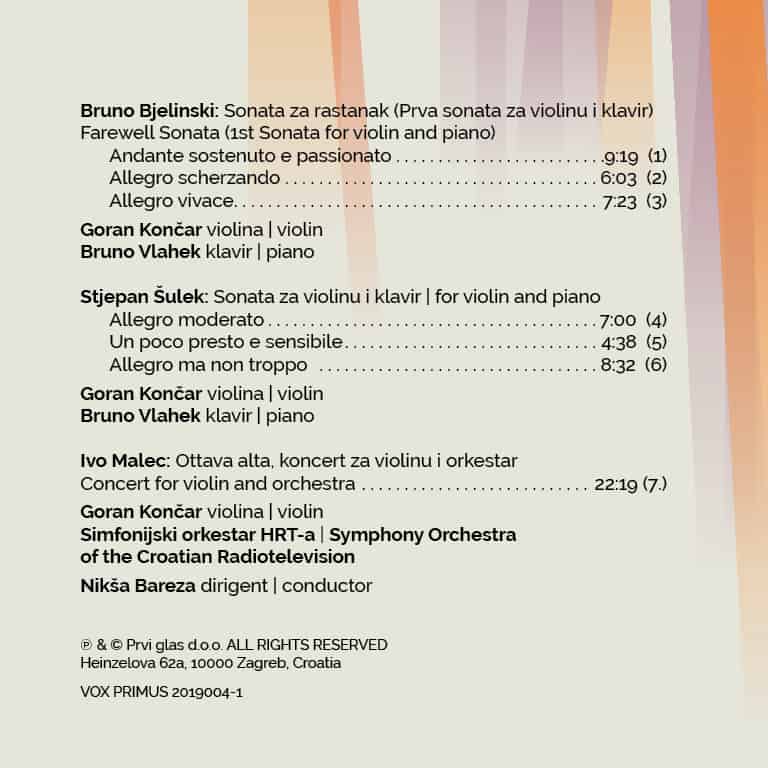
Bruno Bjelinski (Trieste, Nov 1st, 1909 – Silba, Sept 3rd, 1992) developed as a composer under the influence of his professors Blagoja Bersa, Franjo Dugan elder and Fran Lhotka. His artistic expression has always overflown with great ideas, playfulness, humor and a very human, friendly approach to his environment.
Bjelinski wrote the First sonata for violin and piano in 1933, during his studies at the Zagreb Music Academy. He revised it in 1976 and named it The farewell sonata – in memoriam to Fran Lhotka. In the same year the revised version was performed by violinist Goran Končar and pianist Ida Gamulin at a Gala concert celebrating Bruno Bjelinski winning the Vladimir Nazor Award.
Although Bjelinski used a classic form for his Sonata, he skipped the slow movement and had slower, elegiac motifs appear in all three movements. In the first movement he brings forward the fundamental musical motifs and hints with its atmosphere at the theme of farewells. The same elements get built on in the classically composed Allegro, to then have a reappearance of the original theme in the coda. The second Allegro scherzando movement brings a playful virtuoso performance of both themes from the first movement, with another elegiac part in the middle. In the third movement Allegro vivace one can hear traces of folkloric motifs, even though they are still encased in a strict classical form. The sonata ends with a coda in morendo that represents the music notation of a goodbye. The clear, sometimes clashing harmonic structures as well as the playful rhythmic motifs present in all three movements, greatly opposing the elegiac, nostalgic themes, are a good summation of Bruno Bjelinski’s whole approach to composition.
Stjepan Šulek (Zagreb, Oct 5th, 1914 – Jan 16th, 1986) studied the violin at the Zagreb Music Academy under Vaclav Huml and was occasionally instructed in composition by Blagoja Bersa. He acted as a chamber musician (piano trio with Ivan Maček and Antonio Janigro, the first violinist in the Zagreb quartet) and as a conductor for the RTV Zagreb Chamber Orchestra, and from 1947 he worked as a composition professor at the Zagreb Music Academy. By teaching generations of contemporary Croatian composers, Šulek greatly contributed to raising the standard of composing in Croatia. His own works are characterized by high professionalism and a flawless composing skill.
Šulek is primarily a neoclassicist by style, although in reality he synthesizes baroque structure, classic forms and a romantic expression. Harmonically he stayed in the framework of the key / tonality.
Šulek wrote the Violin sonata in 1972 and performed it himself for the premiere. Although the violin opposes the piano with its seductive, romantic themes, the suspense within the three-movement classic form brings a post-modern richness to the sound. Chromatic modulations underline Šulek’s personal composition style, but with a subjective approach to the sound of the violin, his personal instrument.
At the same time he performed the Sonata Goran Končar also recorded Šulek’s string quartets and Omage a Vaclav Huml with the Zagreb Quartet, as well as the Violin concert with the Zagreb Philharmonic under the conductor Pavle Dešpalj and the Symphony Orchestra of HRT under the leadership of Nikša Bareza.
The Sonata was recorded on Stjepan Šulek’s violin, which can be found today in his inheritance in the Stjepan Šulek Fondation, which has been giving awards in his name from 1993. The Award is symbolically connected to two of Šulek’s greatest artistic activities, so every year the award alternates between best composer and best violinist, representing an acknowledgement of the accomplishments of young musicians for their work, but also encouragement for further growth.
For his amazing contribution to our music culture, both as a composer and as a teacher, he received the Vladimir Nazor Award for his life’s work in 1973.
Ivo Malec (Zagreb, Mar 30th, 1925 – Paris Aug 14th, 2019) was a composer and conductor, who finished his studies in composition under Milo Cipra as well as conduction at the Zagreb Music Academy, and further studied under O. Messiaen in Paris. In 1959 he moved to Paris where he met Pierre Schaeffer, Darius Milhaud and André Jolivet, and worked in the Groupe de Recherches Musicales GRM from 1960 to 1990. At that time he created the compositions Tutti (1962), Cantate pour elle (1966), Lumina (1968) and Attacca (1986). He found a unique convergence of technique and technology there, ideally suited for his creative needs, and the exploration and experimentation with sound in those early years can be seen in his masterful works from the 90s, such as Exempla (1994), Sonoris causa (1997) and perhaps his most interesting work the Concert for violin and orchestra Ottava alta (1995), a composition that explores the furthest capabilities of the classic violin in its highest register. Ottava alta was a turning point in the entire composing world for the violin at the end of the 20th century. The many effects and the overflow of the sound colours from the soloist to each of the members of the ensamble make the composition remarkably complex. The violin, timpani and percussion canon, as well as the carrying of the main music ideas from solo parts to the whole group of instruments make this Concert a nearly unique example of a perfect avant-garde composition, experienced within his own identity and the time in which it was created.
The Concert was performed by Raphaël Oleg and the RTL Orchestra for its premiere, under the direction of the composer himself on December 14th, 1995 in Luxembourg.
The violinist Goran Končar and the HRT SO performed the premiere of the Concert in 1998, under the guidance of mo Nikša Bareza, when a studio recording was also made featuring the composer himself as music producer. As an advisor, he helped the concert be performed exactly the way he intended it to be.
Ivo Malec worked as a composition professor at the Conservatoire National Supérieur de Musique from 1972 to 1990, succeeding his friend, composer Henri Dutilleux, and educating a number of young composers who would go on to become the new generation of French music. He won many awards, amongst which were the City of Zagreb Award (1957); Grand Prix du disque (five times); Grand Prix de la Sacem (1975); Grand Prix National de la Musique (1992); Chevalier dans l’Ordre National de la Légion d’Honneur; Chevalier dans l’Ordre National du Mérite, Commandeur dans l’Ordre des Arts et Lettres, Prix de l’Académie des Beaux–Arts (2010) and Grand Prix International Arthur Honegger (2010). His compositions were published by Salabert, Breitkopf & Härtel and Ricordi, and the discographic edition by Philips, Harmonia Mundi, Erato and Ina-GRM.
About the performers
Goran Končar
Goran Končar (b. 1954), one of the most prominent Croatian violinists, studied at the Music Academy in Zagreb with Martin Barić and Josip Klima and obtained a master’s degree in the class of Leonid Kogan at the Tchaikovsky Conservatory in Moscow in 1978. He also studied with Max Rostal in Bern and Henryk Szeryng in Geneva, then with Yfrah Neaman in London. He was Neaman’s assistant at the Guildhall School of Music from 1981 to 1983. He has been teaching at the Zagreb Music Academy since 1988 and has held master classes in Madrid, Berlin, Turin, Milan, Sidney, Tokyo, Beijing, Stellenbosch and elsewhere. In 2004, he started the LAUS Summer Academy in Dubrovnik together with the world’s greatest violinists (Zakhar Bron, Viktor Tretyakov, Dmitry Sitkovetsky, Leonid Sorokow).
His international solo career began in 1982 with guest performances in the majority of European countries, as well as the USA, Japan, Korea and Israel. From 1984 to 1994 he was the concertmaster of the Royal Philharmonic Orchestra in London, the Croatian Radio Television Symphonic Orchestra and Zagreb Philharmonic. He has performed with renowned orchestras and conductors all over the world.
He won first and special prizes at national competitions, as well as the Music Life Award in Moscow (1980) for his performance of Shostakovich’s Concerto for violin and orchestra, the first prize at the International Competition in Bratislava (1984) and numerous other accolades. Among the awards received the Vladimir Nazor Award (2006) holds a prominent place.
In his solo and educational activities he is particularly dedicated to interpretations of works by Johann Sebastian Bach (solo sonatas and partitas), as well as to the repertoire created with Max Rostal (W. A. Mozart and the French Bruch, E. Bloch, F. Mendelssohn), Yfrah Neaman (J. S. Bach, M. Bruch, E. Bloch, F. Mendelssohn) and Leonid Kogan (Russian literature-P. I. Tchaikovsky, A. Glazunov, A. Khachaturian, S. Prokofiev and D. Shostakovich, the performance of whose works he was the first foreigner to receive a Russian award for). He pays special attention to the performances of the classics of the 20th century (B. Bartok, B. Martin, S. Gubaidulin, A. Nilsson, K. Goldmark) and contemporary pieces, which is why numerous composers have dedicated their works to him (Boris Papandopulo, Milko Kelemen, Giuseppe Gavazza, D. Holloway, Ivo Malec).
His first record was released by EMI in 1984 in London, and he also recorded for the BBC, CBS, France Musique, HRT and other radio and TV stations. Croatia Records released one of the rare integral performances of Eugène Ysaÿe’s violin sonatas.
From 1987 to 2012 he managed the Zagreb Quartet and for a full quarter of a century his skill and art were part of this oldest Croatian and European chamber ensemble.
The Zagreb Quartet was established as far back as 1919, and for a period of one century it was the basis of the tradition of chamber music making in Croatia; in this tradition Goran Končar is certainly one of its pivotal personalities. During this period he appeared in more than 2000 concerts, and under his guidance the Zagreb Quartet had more than 1000 performances, appearing on all continents in the best known concert halls of the world, and cooperated with a large number of Croatian and foreign soloists. Končar also played the majority of first performances of works composed by Croatian composers written for the string quartet and he also published 15 albums. Under Končar’s guidance the Zagreb Quartet performed all quartets composed by Shostakovich, Mozart, Prokofiev, Janáček, the majority of Haydn’s quartets and all quintets.
Professionally, he is dedicated to studying the sound of historical instruments and raising awareness of the value of tonal wood from Croatia and Bosnia that was used to make the most valuable instruments. In order to promote Croatian makers of string instruments, in 2005 he initiated the founding of the Croatian Association of Professional Makers and Restorers of String Instruments.
For a number of years he played on Giovanni Battista Guadagninis’ violin which the Croatian violinist and composer Stjepan Šulek left to the Stjepan Šulek Foundation as well as on the violin King by Giuseppe Guarneri del Gesù from 1735 that is in possession of the Croatian Academy of Sciences and Arts (HAZU).
Bruno Vlahek
Bruno Vlahek was born 1986 in Zagreb, where he graduated piano in Vladimir Krpan’s class as one of the youngest students in history of the Music Academy. He pursued postgraduate studies at the Conservatoire de Lausanne with Jean-François Antonioli and at the Hochschule für Musik in Cologne with Vassily Lobanov, where he also studied composition and improvisation. From 2010-13, he was guided by legendary Dmitri Bashkirov at the Queen Sofía College of Music in Madrid. Vlahek won the first prizes at the international piano competitions Alexander Scriabin in Paris 2010 and Ricard Viñes in Lleida 2008; was laureate of the 6th China Shanghai International Piano Competition 2012, EPTA International Piano Competition Svetislav Stancic in Zagreb 2007, received the title of Young Musician of The Year 2010 in Croatia, and won prizes such as Swiss Prix Paderewski, Yamaha Foundation’s Award in Madrid, Pnina Salzman Memorial Award in Israel and Artists on Globe Award 2014. For his achievements he was awarded the Honorary Diploma of Her Majesty Queen Sofía of Spain.
He regularly gives recitals and appears with leading orchestras throughout Europe, Asia, Africa, South America, Russia and Israel. He performed in prestigious halls such as Palau de la Música Catalana in Barcelona, Liszt Academy in Budapest, Auditorio Nacional de Música in Madrid, Gasteig in Munich, Mozarteum in Salzburg, Tel Aviv Museum of Art, Shanghai Concert Hall, Seoul Arts Centre, and at the festivals of Bolzano, Dubrovnik, Moscow, Palma de Mallorca, Dar es Salaam and Verbier.
In 2008 he recorded Saint-Saëns’ 2nd Piano Concerto with Orchestre de Chambre de Lausanne for Radio Suisse Romande. He has composed more than 40 orchestral, chamber, solo and choral works of various genres which have been performed in European music centres (Amsterdam, Berlin, Lisbon, London, Moscow, Prague, Vienna, St. Petersburg), in North and South America, China, South Korea, and at the ISCM’s World New Music Days 2010 in Sydney (Australia). In 2012 he won the 1st prize at the XXXIII International competition for Organ works Cristobal Halffter in Spain. His works have been published in United Kingdom and USA.
Nikša Bareza
Conductor Niksa Bareza, longtime chief conductor of the HRT Symphonic Orchestra, first studied with Milan Sachs, Hermann Scherchen and Herbert von Karajan, then collaborated with great conductors such as Lovro pl. Maticic, Ferdinand Leitner, Otmar Suitner and Nikolaus Harnoncourt. He was the first conductor and director of the Opera of the Croatian National Theater in Zagreb, and later he was a permanent conductor of the Opera in Zurich, Petrograd and Graz, where he was also the chief conductor of the Philharmonic Orchestra. He regularly performs at leading European opera houses (Hamburg, Milan, Paris, Vienna, Berlin, Munich, Frankfurt, Dresden, Leipzig, Prague, Bologna, Florence, Parma, Trieste, Oslo, etc.). From 2001 to 2007 he was the chief conductor of the Opera and Philharmonic of Robert Schumann in Chemnitz, and for several seasons the music director of the city. He is also a regular guest of many international concert stages where he collaborates with leading European orchestras. He is particularly committed to contemporary music, but he pays great attention to the Croatian musical heritage and new achievements of local composers. The recordings of Wagner’s Ring of Nibelung and the opera Il Campiello by Ermann Wolf-Ferrari (played by the Trieste Opera Verdi), for which he won the platinum discography medal in Paris, are particularly noteworthy in his discography. The compact disc of the Alpine Symphony by Richard Strauss, performed by the HRT Symphony Orchestra under Bareza’s conducting, is particularly noted in Croatian discography. A number of awards and recognitions include the Porin Lifetime Achievement Award (2008) and the prestigious Mozart award from the Chemnitz Association in recognition of his continued engagement, as well as recognition for his professional and sensible interpretation of music.
Croatian Radio Television Symphonic Orchestra
Croatian Radio Television Symphonic Orchestra started its activity in 1930, just four years after the beginning of the former Radio Zagreb broadcast. In 1951 the Chamber Orchestra of Radio Zagreb was founded, gaining recognition at home and abroad under its first conductor Antonio Janigro (after whom it was led by Stjepan Šulek and Pavle Dešpalj). The Orchestra gradually grew to a Symphonic orchestra; from 1957 it began to act under the name of the Symphonic Orchestra of Radio-Television Zagreb, and from 1975 until 1990 it was called the Zagreb Symphonic, and from 1991 it had its current title. Many prominent conductors stood at the head of the orchestra : Pavle Dešpalj, Krešimir Šipuš, Josef Daniel, Oskar Danon, Milan Horvat, Uroš Lajovic, Vladimir Kranjčević and Nikša Bareza. Among the many conductors and soloists with whom the ensemble worked were Lovro von Matačić, Igor Markevic, Franz Konwitschny, Claudio Abbado, Lorin Maazel, Zubin Mehta, Ernst Bour, Stjepan Šulek, Arnold Katz, Krzysztof Penderecki, Antonio Janigro, André Navarra, Leonid Kogan, Henryk Szeryng, Aldo Ciccolini, Ruža Pospiš-Baldani, Dunja Vejzović, Dubravka Tomšič-Srebotnjak, Rudolf Klepac, Ivo Pogorelić, Mstislav Rostropovich, Maxim Fedotov, Edita Gruber, José Carreras, Ruggero Raimondi, Barbara Hendricks, Luciano Pavarotti and others. In addition to regular concert work in Zagreb, and the obligation to regularly operate in radio and television programs, the Orchestra tours throughout the country and abroad. At these tours the Orchestra experienced universal recognition and became the cultural ambassador of Croatia in the world. At the beginning of the Homeland War, the Symphonic Orchestra musicians put their skills and talents into service for the country. Dozens of concerts were held in the towns where battles took place, from Pakrac, Lipik, Đakovo, Gospić, Vinkovci to Šibenik, Zadar, Karlovac, and even Sarajevo. With a classic and contemporary repertoire, performed in concerts and recordings for radio, television and record companies, the Orchestra pays special attention to the Croatian musical heritage and contemporary repertoire. In its interesting discographic opus, especially notable are the author compact discs of composers Stjepan Šulek, Milko Kelemen and Miro Belamarić, a series of 5 CDs dedicated to the chief conductors of the Orchestra, the Alp symphony by Richard Strauss and a record with the works of italian composer Gino Marinuzzi the older (both of the latter under the conducting of Nikša Bareza).
